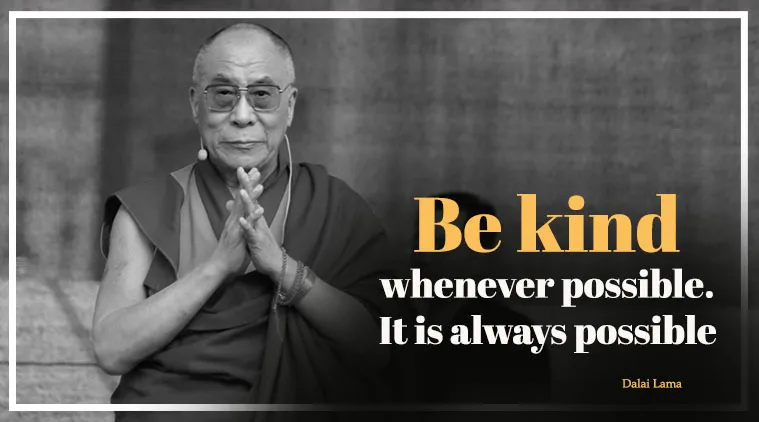

Only the development of compassion and understanding for others can bring us the tranquility and happiness we all seek. Real change in the world will only come from a change of heart. A disciplined mind leads to happiness, and an undisciplined mind leads to suffering. Just because they’re not on your road doesn’t mean they’ve gotten lost. If you can cultivate the right attitude, your enemies are your best spiritual teachers because their presence provides you with the opportunity to enhance and develop tolerance, patience and understanding.” Dalai Lama People take different roads seeking fulfillment and happiness. If you want to be happy, practice compassion. If you want others to be happy, practice compassion. We need to learn to want what we have, not to have what we want, in order to get stable and steady happiness. The goal is not to be better than the other man, but your previous self. To conquer oneself is a greater victory than to conquer thousands in a battle. Your philosophy is simple kindness.” Dalai Lama It is under the greatest adversity that there exists the greatest potential for doing good, both for oneself and others. Your own mind, your own heart is the temple. 29 Wise Dalai Lama Quotes to Enrich Your Lifeġ4 Most Powerful Dalai Lama Quotes on Life & Happiness.29 Uplifting Dalai Lama Quotes to Empower You.14 Most Powerful Dalai Lama Quotes on Life & Happiness.He said his mother's compassion has affected him and stayed with him all his life, leading him to show compassion to people, animals and insects alike, with the exception of mosquitoes, he joked.

Born in 1935, he was discovered as the reincarnation of the 13th Dalai Lama when he was 2 and began his monastic education at the age of 5. "We never saw our mother's angry face, always gentle," he said. He then talked about his own mother, who was uneducated but whom he described as always very kind. "Our survival is entirely based on mother's care," he said, adding, "We are born with the potential for compassion." For example, from the moment of birth, the "child shows tremendous close feeling" to his mother, who gives her or him milk, and in turn, mothers also express care and love. The way human life is structured, he said, shows the importance of human affection. "Our body element is closer to those positive emotions," he said. They have better blood circulation and digestion and sleep better, whereas people who carry anger and hatred inside them also suffer physically. Our teeth are "made to smile" and our "fingers are well-equipped to shake hands" and to hug.Ĭompassionate people, he averred, have a balance of calm mind and physical health. In "our own case, our nails are very gentle," he said. He also noted that "our basic physical structure" is "not like tigers - those meat-eater animals," which "in order to take other lives, they are equipped in a special way" with claws and large teeth. The most important experiences in life, he pointed out, are birth and death, which occur without formalities. With an infectious humility and affable sense of humor, the Dalai Lama won over the audience by saying he preferred to speak in an informal manner that reduces barriers. Speaking seated cross-legged on a simple upholstered wooden armchair set on a small stage, the Dalai Lama said that "nonviolent action depends entirely on peace of mind." If a person's mind is strong and peaceful in the midst of a hostile situation, then the situation can be handled with clarity, he said, adding that by expressing warm-heartedness and compassion, a person can solve difficult problems without losing basic human values. He commented that if two countries point nuclear warheads at each other, and peace is created because "both sides are ready to shoot," that truce is based on fear and negativity and is not true peace. "Peace does not mean just a mere absence of violence," said the Dalai Lama, who was awarded the 1989 Nobel Peace Prize.

In his second visit to campus - the first was in 1991 - the Dalai Lama spoke on "A Human Approach to World Peace." The lecture also was streamed live on the Internet and telecast for overflow audiences at two locations on campus. Genuine peace, he declared, "must come from internal peace."

9) that world peace begins with individuals finding their own inner peace. His Holiness the 14th Dalai Lama, the spiritual leader of Tibetan Buddhism, told an audience of about 5,000 people in Cornell's Barton Hall today (Oct. The Dalai Lama exhibits his affable sense of humor during his talk.


 0 kommentar(er)
0 kommentar(er)
